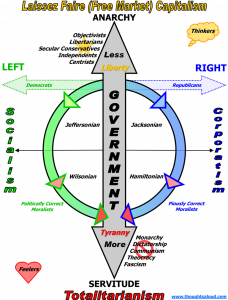 A “Free†Press?
A “Free†Press?
Among other prohibitions, the first amendment to our Constitution prohibits infringing on the freedom of the press.
I understand this to mean that the government is not supposed to tell journalists what they can or cannot convey via whatever medium they work in. All well and good. But, does this “freedom†include the freedom to knowingly misinform and/or confuse?
By “ knowingly misinform and/or confuseâ€, I mean such things as: intentionally lying; intentionally omitting salient facts so as to distort; not reporting events that are of concern to the general public and the like.
For sure, I have no concern with the notion of an expressed opinion (especially since I express so many of my own). But, at the same time, I think that an “opinion†should be clearly that, whether so indicated by the medium in which it is expressed (such as a blog, a letter to the editor of a newspaper or a byline that is clearly for the expression of opinion. Where I do have a concern is when either an opinion or an intentional distortion of truth are offered as â€news coverageâ€, something that happens with increasing frequency in our republic.
While I would not suggest any modification or limitation of freedom of the press, it seems to me there should be some enforceable standards for accuracy and honesty.
In my humble opinion, freedom of the press does not derive from the journalist’s right to sell his/her words for profit (although I see nothing inherently wrong with that) – rather, it derives from the public’s right to know what is going on around them because access to the truth is one of the fundamental building blocks of self government.
How then, might we clean up the sewer that currently passes for a “mainstream media†without fundamental damage to an essential right? I know that we have existing laws against libel and slander but these are very hard to invoke and the cost of doing so is beyond the means of the average citizen, even if they were a viable solution – which IMHO, they are not.
Tuning to another channel or canceling a subscription can help some (especially the latter since its impact is some much more obvious), yet this hardly seems enough and it puts too great a burden on the consumer of bad information – who often does not even know he/she is being misled or that critical information is being withheld.
What I seek is something akin to the “truth in advertising†laws – something like a “truth in news reporting†law which places the burdens on the purveyors, not the consumers of news.
Obviously (I hope), I am most concerned when the “news†in question has to do with the actions of government at any level. And I am especially concerned over the current trend of having reports regarding our government “spun†such that they give cover to illegal, improper or unethical activities.
Please respond with suggestions as to how such a thing might be implemented – while, at the same time, doing nothing to restrict the free flow of information. And, please keep in mind that I wish nothing to be done to stop anyone from expressing what is clearly “opinionâ€.
Think about it.
Troy L Robinson

Normally I would expect some degree of opinion differences in the media. If the NY times puts out a spin piece one would expect some challenge from other media sources. For the average reader this means rejecting obvious propoganda and looking for news elsewhere. I never look at the Puffington post now, have seen too much garbage in the past and don’t have time to shovel through the manure. I check The Blaze on and off, but skip over the religious blather, fortunately they compartmentalize it nicely for me.
As always the responsibility of sorting the wheat from the chaff is our own. Checking stories against our own determination of reality and researching that we deem to be important is about all we can do.